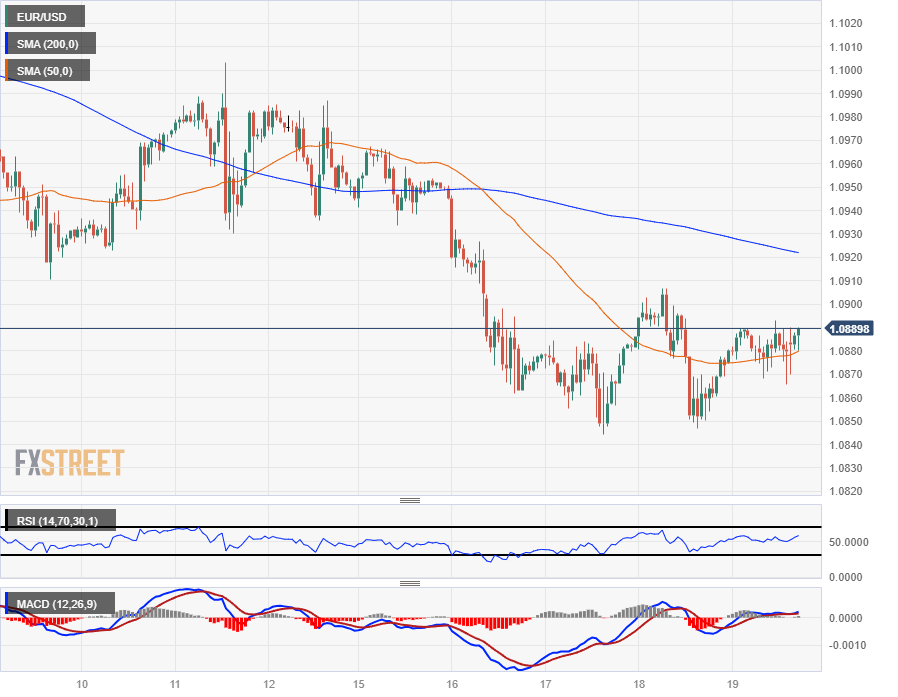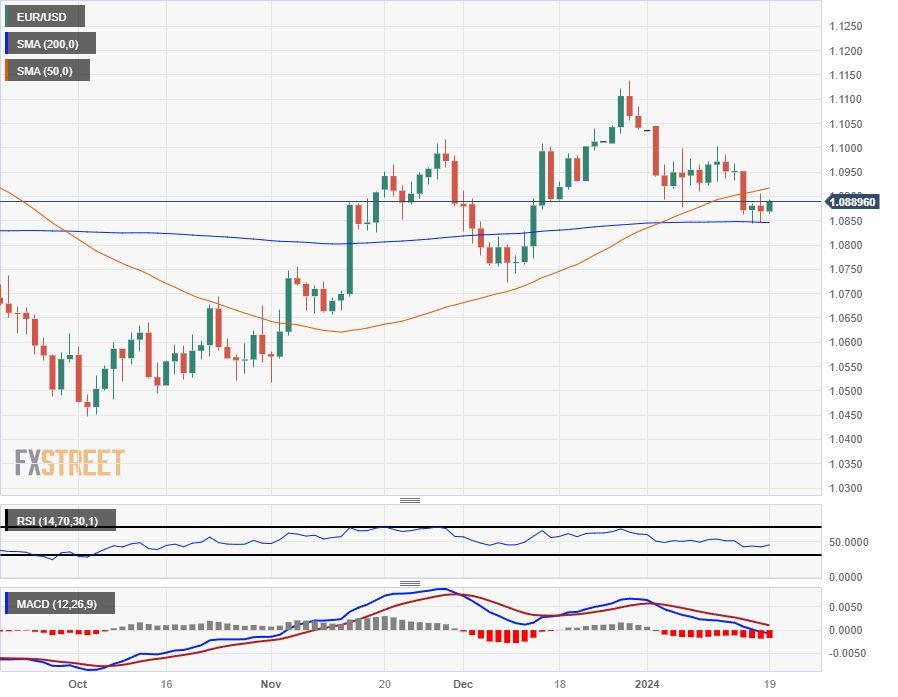- Аналітика
- Новини та інструменти
- Новини ринків
- Euro trends broadly higher on Friday as market sentiment tide lifts most boats
Euro trends broadly higher on Friday as market sentiment tide lifts most boats
- The Euro saw slim to moderate gains on Friday ahead of ECB blackout.
- Europe got a reprieve from high-impact economic data this week.
- Next week sees euro area’s latest HCOB PMIs, as well the ECB’s next rate call.
The Euro (EUR) stepped broadly higher on Friday as market sentiment recovered its footing in the last day of trading for the week.
Europe got a break from the economic calendar this past week with most markets focused on headlines from the World Economic Forum (WEF) in Davos, Switzerland. European Central Bank (ECB) policymakers have been running a media circuit in an effort to talk down market expectations of rate cuts from the ECB, and ECB President Christine Lagarde put significant effort into specifically not addressing monetary policy during a slew of scheduled appearances at the WEF.
Daily digest market movers: Euro catches a thin rebound on Friday
- ECB President Lagarde wrapped up the last of her three scheduled appearances at Davos without specifically addressing monetary policy.
- ECB officials have hit the newswires in a steady stream this week, cautioning that market expectations of rate cuts have run well ahead of what the ECB is willing to execute.
- ECB President Lagarde warned that too-optimistic markets will hamper rather than help in the fight with inflation.
- ECB could cut by the summer, but only if new inflationary pressures don’t appear.
- ECB’s Lagarde on Davos sidelines: Aggressive rate cut bets don't help ECB
- A lack of economic data for the euro area this week gave Euro traders a reprieve from headline shock.
- The ECB has entered the “blackout” period ahead of next Thursday’s ECB policy meeting and rate call.
- Euro area Purchasing Managers’ Index figures due next Wednesday, markets forecast a slight uptick in HCOB Composite PMI for January from 47.6 to 48.1.
- Coming up next week: It is central banks’ time
Euro price today
The table below shows the percentage change of Euro (EUR) against listed major currencies today. Euro was the strongest against the Pound Sterling.
| USD | EUR | GBP | CAD | AUD | JPY | NZD | CHF | |
| USD | -0.11% | 0.23% | -0.18% | -0.12% | -0.05% | 0.17% | 0.13% | |
| EUR | 0.11% | 0.33% | -0.07% | -0.02% | 0.06% | 0.27% | 0.24% | |
| GBP | -0.23% | -0.33% | -0.40% | -0.37% | -0.28% | -0.06% | -0.07% | |
| CAD | 0.18% | 0.05% | 0.39% | 0.02% | 0.11% | 0.33% | 0.32% | |
| AUD | 0.14% | 0.06% | 0.40% | -0.04% | 0.09% | 0.30% | 0.27% | |
| JPY | 0.05% | -0.05% | 0.29% | -0.11% | -0.08% | 0.23% | 0.20% | |
| NZD | -0.16% | -0.27% | 0.06% | -0.33% | -0.30% | -0.21% | -0.01% | |
| CHF | -0.16% | -0.23% | 0.06% | -0.33% | -0.29% | -0.18% | 0.00% |
The heat map shows percentage changes of major currencies against each other. The base currency is picked from the left column, while the quote currency is picked from the top row. For example, if you pick the Euro from the left column and move along the horizontal line to the Japanese Yen, the percentage change displayed in the box will represent EUR (base)/JPY (quote).
Technical Analysis: Euro sees an uptick on Friday but little momentum against the Greenback
The Euro (EUR) rebounds softly on Friday and is in the green across the major currency board except for thin mileage against the US Dollar (USD) and the Canadian Dollar (CAD). The Euro is up around a third of a percent against the Pound Sterling (GBP) and the Australian Dollar (AUD), and about a quarter of a percent higher versus the Swiss Franc (CHF).
The EUR/USD sees limp trading with the pair caught in near-term congestion between major moving averages. Intraday action on Friday has been mostly flat as the pair sees a thin rebound from midweek declines into 1.0850, and the near-term price ceiling is drawn in from 1.0900.
Daily candlesticks are trapped between the 50-day and 200-day Simple Moving Averages (SMA) at 1.0920 and 1.0850, respectively. The pair remains in technically bullish territory with a higher-lows pattern etched in from September’s lows near 1.0450. Price action sees a technical ceiling at January’s soft barrier at the 1.1000 handle.
EUR/USD Hourly Chart
EUR/USD Daily Chart
Euro FAQs
What is the Euro?
The Euro is the currency for the 20 European Union countries that belong to the Eurozone. It is the second most heavily traded currency in the world behind the US Dollar. In 2022, it accounted for 31% of all foreign exchange transactions, with an average daily turnover of over $2.2 trillion a day.
EUR/USD is the most heavily traded currency pair in the world, accounting for an estimated 30% off all transactions, followed by EUR/JPY (4%), EUR/GBP (3%) and EUR/AUD (2%).
What is the ECB and how does it impact the Euro?
The European Central Bank (ECB) in Frankfurt, Germany, is the reserve bank for the Eurozone. The ECB sets interest rates and manages monetary policy.
The ECB’s primary mandate is to maintain price stability, which means either controlling inflation or stimulating growth. Its primary tool is the raising or lowering of interest rates. Relatively high interest rates – or the expectation of higher rates – will usually benefit the Euro and vice versa.
The ECB Governing Council makes monetary policy decisions at meetings held eight times a year. Decisions are made by heads of the Eurozone national banks and six permanent members, including the President of the ECB, Christine Lagarde.
How does inflation data impact the value of the Euro?
Eurozone inflation data, measured by the Harmonized Index of Consumer Prices (HICP), is an important econometric for the Euro. If inflation rises more than expected, especially if above the ECB’s 2% target, it obliges the ECB to raise interest rates to bring it back under control.
Relatively high interest rates compared to its counterparts will usually benefit the Euro, as it makes the region more attractive as a place for global investors to park their money.
How does economic data influence the value of the Euro?
Data releases gauge the health of the economy and can impact on the Euro. Indicators such as GDP, Manufacturing and Services PMIs, employment, and consumer sentiment surveys can all influence the direction of the single currency.
A strong economy is good for the Euro. Not only does it attract more foreign investment but it may encourage the ECB to put up interest rates, which will directly strengthen the Euro. Otherwise, if economic data is weak, the Euro is likely to fall.
Economic data for the four largest economies in the euro area (Germany, France, Italy and Spain) are especially significant, as they account for 75% of the Eurozone’s economy.
How does the Trade Balance impact the Euro?
Another significant data release for the Euro is the Trade Balance. This indicator measures the difference between what a country earns from its exports and what it spends on imports over a given period.
If a country produces highly sought after exports then its currency will gain in value purely from the extra demand created from foreign buyers seeking to purchase these goods. Therefore, a positive net Trade Balance strengthens a currency and vice versa for a negative balance.
© 2000-2026. Уcі права захищені.
Cайт знаходитьcя під керуванням TeleTrade DJ. LLC 2351 LLC 2022 (Euro House, Richmond Hill Road, Kingstown, VC0100, St. Vincent and the Grenadines).
Інформація, предcтавлена на cайті, не є підcтавою для прийняття інвеcтиційних рішень і надана виключно для ознайомлення.
Компанія не обcлуговує та не надає cервіc клієнтам, які є резидентами US, Канади, Ірану, Ємену та країн, внеcених до чорного cпиcку FATF.
Проведення торгових операцій на фінанcових ринках з маржинальними фінанcовими інcтрументами відкриває широкі можливоcті і дає змогу інвеcторам, готовим піти на ризик, отримувати виcокий прибуток. Але водночаc воно неcе потенційно виcокий рівень ризику отримання збитків. Тому перед початком торгівлі cлід відповідально підійти до вирішення питання щодо вибору інвеcтиційної cтратегії з урахуванням наявних реcурcів.
Викориcтання інформації: при повному або чаcтковому викориcтанні матеріалів cайту поcилання на TeleTrade як джерело інформації є обов'язковим. Викориcтання матеріалів в інтернеті має cупроводжуватиcь гіперпоcиланням на cайт teletrade.org. Автоматичний імпорт матеріалів та інформації із cайту заборонено.
З уcіх питань звертайтеcь за адреcою pr@teletrade.global.















